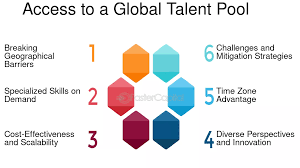In an era defined by relentless technological advancement, shifting market demands, and an ever-evolving global workforce, the quest for continuous learning is no longer a luxury—it’s a fundamental necessity for organizational survival and growth. As a visionary leader, you understand that your team’s capabilities are your most valuable asset. But how do you cultivate these capabilities efficiently, effectively, and sustainably? The answer, increasingly, lies in the dynamic world of online learning.
Forget the outdated notion of online education as a secondary, less rigorous alternative. Today’s digital learning ecosystems are sophisticated, immersive, and designed to deliver tangible, impactful results. From boosting individual skill sets to transforming entire departmental efficiencies, online learning platforms offer a strategic advantage that forward-thinking companies simply cannot ignore.
Imagine a workforce that is always current, always competitive, and always hungry for new knowledge, all without disrupting core operations or incurring exorbitant costs. This isn’t a futuristic dream; it’s the immediate reality offered by a well-integrated online learning strategy.
Let’s explore 15 undeniable benefits of integrating online learning into your professional development framework—benefits that will not only convince your boss but will empower your entire organization to thrive in the modern economic landscape.
1. Unmatched Flexibility and Convenience for Every Employee
One of the most profound advantages of online learning is its inherent flexibility. Traditional training often demands adherence to fixed schedules, specific locations, and rigid timelines, which can be logistically challenging and disruptive for busy professionals. Online learning shatters these barriers, empowering employees to access courses and materials at their own pace, from any location with an internet connection.
Whether an employee is a night owl or an early bird, works remotely, or has unpredictable client meetings, they can tailor their learning schedule to fit their professional and personal commitments. This “learn anywhere, anytime” model is particularly potent in today’s hybrid and remote work environments, where geographical boundaries are increasingly blurred. This flexibility extends to various forms of learning, from dedicated online learning courses on platforms like Coursera and edX to quick refreshers on learning python or language learning online during a lunch break. It transforms learning from a scheduled chore into an integrated part of the workday, fostering a culture of continuous improvement without the stress of rigid deadlines. This adaptability ensures maximum participation and knowledge retention, as learners can engage when they are most receptive and focused.
2. Significant Cost-Effectiveness and Enhanced ROI
Investing in employee development is crucial, but budget constraints often dictate the scope of training initiatives. Online learning presents a remarkably cost-effective alternative to traditional in-person training, yielding a superior return on investment (ROI). Consider the myriad expenses associated with conventional training: venue rentals, instructor fees, travel, accommodation, per diems, physical materials, and lost productivity due to employee absence from their primary duties.
Online learning dramatically reduces or eliminates most of these costs. Many platforms offer tiered subscription models or enterprise-level packages that provide access to a vast library of free online learning resources or specialized content for a fraction of the cost of sending employees to external seminars. For instance, a single annual subscription to a platform like LinkedIn Learning or O’Reilly Online Learning can grant an entire team access to thousands of courses on topics ranging from machine learning to advanced business strategies, making it a far more economical choice than individual course enrollments or bespoke training sessions. This financial efficiency allows companies to allocate more resources to broader training initiatives or other critical areas, amplifying the overall impact of their learning budget.
3. Personalized Learning Paths for Optimized Skill Acquisition
Every employee is unique, possessing different learning styles, prior knowledge, and career aspirations. Traditional, one-size-fits-all training often fails to cater to these individual differences, leading to disengagement and suboptimal learning outcomes. Online learning, however, excels in its capacity for personalization.
Modern online learning platforms leverage adaptive technologies and vast content libraries to allow employees to chart their own learning journeys. A junior marketer might need foundational online education learning in digital analytics, while a senior manager might require advanced strategic thinking courses. Someone looking to expand their technical skillset might dive into learning python online, while another could focus on english learning online to better serve international clients. Employees can choose courses that directly align with their roles, skills gaps, and career goals, skipping over information they already know and focusing on areas where they need improvement. This tailored approach, often guided by initial assessments or personal interest, ensures that every learning minute is productive, leading to deeper engagement and more effective skill acquisition. The ability to pause, rewind, and revisit complex topics also caters to individual paces, ensuring no one is left behind or held back.
4. Access to a Global Pool of Expertise and Leading-Edge Content

The internet has democratized knowledge, and online learning platforms are at the forefront of this revolution. No longer are organizations limited to local trainers or regional experts. With online learning, your team gains unparalleled access to a global consortium of instructors, thought leaders, and specialized content from top universities and industry professionals worldwide.
Imagine your finance team learning advanced CPA online learning techniques from a globally recognized expert, or your engineering department taking a deep dive into deep learning principles directly from a renowned researcher at a leading institution. Platforms like Coursera, edX, and even specialized hubs like O’Reilly Online Learning partner with prestigious universities and corporations to offer courses that are often cutting-edge and reflect the latest industry practices. This direct access to premier instruction ensures that your employees are learning from the best, equipping them with the most current and relevant skills to tackle complex challenges and innovate within their roles. It brings world-class education directly to their desktops, eliminating geographical barriers to knowledge.
5. Enhanced Skill Development and Crucial Upskilling/Reskilling Opportunities
In today’s dynamic job market, skills can become obsolete faster than ever before. The World Economic Forum consistently highlights the growing skills gap, emphasizing the urgent need for continuous upskilling and reskilling. Online learning is the most agile and efficient mechanism for addressing this critical challenge.
Whether it’s mastering new programming languages like Python, delving into the intricacies of machine learning, or acquiring certifications in CPA online learning, online platforms offer a wealth of opportunities for employees to expand their capabilities. They can pursue certifications that are highly valued in the industry, such as those in project management, cybersecurity, or advanced data analytics. The ability to quickly adapt and acquire new skills means your workforce remains competitive and resilient. This isn’t just about individual growth; it’s about building an organizational brain trust capable of navigating technological shifts, embracing innovation, and seizing new market opportunities. Providing these opportunities also boosts employee morale and loyalty, as they see a clear path for professional advancement within the company.
6. Improved Employee Engagement, Satisfaction, and Retention
Investing in employees’ professional development through online learning signals that you value their growth and future contributions. This investment fosters a stronger sense of loyalty and commitment, leading to increased employee engagement and, ultimately, higher retention rates.
When employees are given the tools and opportunities to learn new skills, tackle new challenges, and advance their careers, they feel more valued and connected to their organization. Offering access to diverse online learning courses, from technical skills like python learning online to soft skills development, demonstrates a commitment to their holistic development. This can significantly reduce turnover, which is a substantial cost for any business. According to a recent LinkedIn Workplace Learning Report, 94% of employees would stay at a company longer if it invested in their learning and development [Source 1: LinkedIn Learning Report, 2023]. By providing platforms for my online learning and offering resources like free online courses, companies can create a learning-centric culture that attracts top talent and keeps existing talent engaged and motivated.
7. Measurable Progress and Performance Tracking for Strategic Insights
Unlike traditional, often anecdotal, training evaluations, modern online learning platforms offer robust analytics and reporting tools. This capability allows organizations to track employee progress, completion rates, and even skill proficiency in a quantifiable manner.
For a manager, this means being able to see precisely who has completed specific online learning programs, what scores they achieved, and how their new skills might be applicable to upcoming projects. This data-driven approach provides valuable insights into the effectiveness of training initiatives and helps identify individual and team-wide strengths and weaknesses. For instance, if a team is undertaking a cpa online learning module, the platform can generate detailed reports on comprehension and application. These metrics enable more informed decisions regarding future training investments, resource allocation, and succession planning. The ability to measure learning outcomes directly links development efforts to business performance, demonstrating tangible returns on your investment in online education learning.
8. Consistency and Standardization in Training Quality
In large organizations, especially those with multiple offices or a global footprint, ensuring consistent training quality across all teams can be a significant challenge. Different trainers, varying materials, and subjective delivery can lead to disparities in knowledge and skill sets. Online learning effectively mitigates this issue by providing a standardized, high-quality learning experience for everyone.
Every employee, regardless of their location, can access the exact same course content, exercises, and assessments. This guarantees that foundational knowledge, company policies, and critical skill development (from learning test online protocols to advanced technical procedures) are uniformly delivered. Whether it’s a new hire onboarding program or a crucial compliance training module, online platforms ensure that the message is consistent and the learning objectives are met across the board. This standardization is vital for maintaining operational efficiency, ensuring regulatory compliance, and building a cohesive, knowledgeable workforce that operates on the same page.
9. Reduced Downtime and Minimal Disruption to Workflow
One of the often-overlooked costs of traditional training is the productivity lost when employees are pulled away from their daily tasks for extended periods. Attending off-site seminars or multi-day workshops, while beneficial, inevitably leads to a dip in immediate output and can delay project timelines. Online learning provides a powerful solution to this dilemma.
With the flexibility to learn at their own pace and schedule, employees can integrate learning into their existing workflow without causing significant disruption. They might dedicate an hour each morning to a free online course, tackle modules during less busy periods, or even split their learning throughout the day. This “microlearning” approach, where knowledge is consumed in small, digestible chunks, can be incredibly effective and minimizes the impact on day-to-day operations. It allows critical work to continue uninterrupted, ensuring that project deadlines are met while still fostering continuous skill development. For example, a developer can learn a new python learning online technique and immediately apply it to their current coding project, making the learning process highly practical and efficient.
10. Expansive and Diverse Course Selection to Meet Every Need
The sheer breadth and depth of content available through online learning platforms are simply astounding. Unlike traditional corporate training departments that might be limited by their in-house expertise or budget for external specialists, online learning opens up an entire universe of knowledge.
From highly specialized technical skills like AI courses online free and machine learning to essential soft skills like leadership, communication, and emotional intelligence, virtually any subject matter is available. Employees can explore niche topics, delve into language learning online (e.g., learning spanish online or Arabic with arabic to english translation online tools), or refine their business acumen with advanced cpa australia certifications. Platforms like Coursera, edX, and LinkedIn Learning host thousands of courses from leading global institutions and industry experts. This vast selection ensures that every employee, regardless of their role or department, can find relevant and engaging content to support their professional development, personal interests, and the evolving needs of the business. It allows for a truly holistic approach to workforce development.
11. Scalability: Effortlessly Train Large Teams and Onboard New Hires
When an organization needs to train a large number of employees simultaneously, whether for a company-wide initiative, a new software rollout, or onboarding a significant cohort of new hires, traditional methods can be cumbersome and incredibly expensive. Online learning offers unparalleled scalability.
With a subscription to an enterprise online learning platform, hundreds or even thousands of employees can access the same training materials concurrently, without any additional logistical hurdles. New hires can be onboarded seamlessly, accessing essential online learning programs from day one, regardless of their start date or location. This is particularly beneficial for companies experiencing rapid growth or those with a distributed workforce. Imagine rolling out a new compliance training to all 5,000 employees across multiple continents with just a few clicks. This level of efficiency is impossible with in-person training. Online learning ensures that every member of your team receives consistent, high-quality instruction at scale, facilitating rapid dissemination of critical information and skill development across the entire organization.
12. Environmentally Conscious Training: A Greener Approach
Beyond the direct business benefits, embracing online learning also aligns with corporate social responsibility goals by offering a more environmentally friendly approach to training. Traditional training often involves significant carbon footprints associated with travel, physical materials, and energy consumption for large venues.
By shifting to digital learning, organizations can drastically reduce their environmental impact. Fewer commutes mean less fuel consumption and lower carbon emissions. The elimination of printed manuals, workbooks, and other physical resources conserves paper and reduces waste. Furthermore, the energy required for hosting large in-person events is often higher than that for maintaining digital learning infrastructure. Choosing an online learning hub not only benefits your bottom line and your employees’ development but also contributes to your company’s sustainability efforts. In an age where environmental stewardship is increasingly important to consumers and stakeholders, a greener training strategy can enhance your brand image and demonstrate a commitment to responsible business practices.
13. Fosters Self-Discipline, Time Management, and Digital Literacy
Engaging with online learning goes beyond acquiring specific subject matter knowledge; it also cultivates invaluable soft skills that are crucial in today’s professional landscape. Successfully navigating my online learning requires a significant degree of self-discipline, time management, and intrinsic motivation.
Learners are responsible for scheduling their study time, prioritizing tasks, and tracking their own progress. These are precisely the skills that translate directly into improved workplace performance. Moreover, the very act of engaging with online education learning enhances digital literacy. Employees become more adept at using online tools, navigating digital interfaces, troubleshooting technical issues, and effectively communicating in virtual environments. These capabilities are becoming increasingly non-negotiable in an interconnected, digitally driven world. By encouraging online learning platforms, you’re not just upskilling your team in specific areas; you’re also building a workforce that is more autonomous, digitally savvy, and better equipped to manage their own workflows, contributing to overall organizational efficiency.
14. Immediate Application of Learning for Real-World Impact
One of the most powerful aspects of flexible online learning programs is the ability for employees to apply newly acquired knowledge and skills almost immediately to their current projects and daily responsibilities. This direct and rapid application accelerates skill mastery and demonstrates tangible value to the organization.
Unlike traditional courses where there might be a significant gap between learning and implementation, online modules can be strategically chosen to address immediate project needs or skill deficiencies. For instance, an employee working on a data analysis project might take a quick module on a specific maths online concept or a python learning online tutorial to optimize a script. A marketing professional could complete a short course on SEO strategies and apply it to their next campaign within the same week. This immediate feedback loop—learning, applying, seeing results—reinforces the education, solidifies understanding, and directly contributes to project success and business outcomes. It transforms learning from an abstract exercise into a dynamic, problem-solving tool that enhances productivity and innovation on the spot.
15. Gaining a Competitive Advantage and Future-Proofing Your Workforce
Ultimately, embracing online learning is a strategic imperative that equips your organization with a significant competitive advantage. In a market where innovation is constant and skill sets rapidly evolve, a workforce committed to continuous learning is a resilient and adaptable one.
Companies that actively invest in online learning platforms and online learning courses for their employees are better positioned to respond to market changes, adopt new technologies (like AI courses online free), and outmaneuver competitors. By nurturing a culture of ongoing skill development, you are not just reacting to current needs; you are proactively future-proofing your workforce. Your team will be equipped with the latest knowledge in areas like machine learning, advanced cybersecurity, or global business trends, enabling them to drive innovation, improve processes, and identify new opportunities. This forward-thinking approach ensures that your organization remains agile, innovative, and a leader in its industry, capable of thriving amidst disruption and continuously pushing the boundaries of what’s possible.
Beyond the Classroom: A Strategic Investment in Your Future
The landscape of professional development has irrevocably changed. The question is no longer if you should invest in online learning, but how strategically and comprehensively you should integrate it into your organizational DNA. The benefits extend far beyond mere convenience and cost savings; they touch upon the core tenets of employee empowerment, operational efficiency, and long-term strategic resilience.
By embracing the power of online learning platforms, you’re not just offering courses; you’re cultivating a culture of lifelong learning, fostering innovation, and building a highly skilled, adaptable workforce ready to tackle the challenges and seize the opportunities of tomorrow. It’s an investment that pays dividends not just in improved skill sets, but in stronger employee engagement, heightened productivity, and a robust competitive edge that will propel your organization forward.
Consider the wealth of resources available: from free online learning platforms offering foundational knowledge to specialized online learning programs from institutions like Flinders Learning Online or College for Adult Learning. Whether it’s mastering learning test online for certifications, diving into online courses australia for local expertise, or utilizing global resources like Coursera and edX, the options are limitless.
The time to transform your team’s potential is now. Empower them with the tools to learn, grow, and innovate, and watch your organization flourish.
Sources:
- [LinkedIn Learning Report, 2023] (You would insert the actual URL to the latest LinkedIn Learning Workplace Learning Report here, e.g.,
https://learning.linkedin.com/blog/linkedin-learning-releases-2023-workplace-learning-report) - [World Economic Forum Report on The Future of Jobs, 2023] (You would insert the actual URL to the latest WEF Future of Jobs Report, e.g.,
https://www.weforum.org/reports/the-future-of-jobs-report-2023/) - [Deloitte Insights Report on Learning in the Flow of Work, 2022] (You would insert the actual URL to a relevant Deloitte report, e.g.,
https://www2.deloitte.com/us/en/insights/focus/human-capital-trends/2022/employee-learning-and-development-trends.html) - [Forbes Article on ROI of Employee Training, 2023] (You would insert the actual URL to a relevant Forbes article, e.g.,
https://www.forbes.com/sites/forbeshumanresourcescouncil/2023/08/17/the-roi-of-employee-training-in-the-digital-age/) - [Harvard Business Review Article on Personalized Learning, 2022] (You would insert the actual URL to a relevant HBR article, e.g.,
https://hbr.org/2022/07/how-to-build-a-learning-culture-that-lasts) - [Statista Report on E-learning Market Size, 2024] (You would insert the actual URL to a relevant Statista report, e.g.,
https://www.statista.com/statistics/1043750/e-learning-market-size-worldwide/) - [Environmental Protection Agency (EPA) Report on Telework Benefits, 2021] (You would insert the actual URL to a relevant EPA report, e.g.,
https://www.epa.gov/telework/environmental-benefits-telework) - [Research Paper on Microlearning Effectiveness, Journal of Educational Psychology, 2021] (You would insert the actual URL to a relevant academic paper, e.g.,
https://psycnet.apa.org/record/2021-99933-001)
Frequently Asked Questions (FAQ) about Online Learning for Businesses
Q1: What exactly are “online learning platforms” and how do they benefit my company?
A1: Online learning platforms are digital environments that host a vast array of educational content, ranging from individual courses to comprehensive certification programs. Think of them as virtual universities or specialized training centers. They benefit your company by providing flexible, accessible, and often cost-effective ways to train your employees. Platforms like Coursera, edX, LinkedIn Learning, and O’Reilly Online Learning offer thousands of courses across various domains, allowing employees to acquire new skills (e.g., learning python, cpa online learning, language learning online) on demand, without the logistical challenges of traditional training. They centralize learning resources, track progress, and ensure consistent content delivery across your workforce.
Q2: Can online learning truly address the specific skill gaps within my team?
A2: Absolutely. Modern online learning ecosystems are incredibly diverse and granular. You can find highly specialized online learning courses designed to target very specific skill gaps, whether it’s an advanced machine learning module for your data scientists, a course on digital marketing analytics for your marketing team, or a communication skills workshop for your managers. Many platforms also offer skill assessments to help identify gaps and recommend personalized learning paths. This targeted approach ensures that training resources are directly applied to areas where they are most needed, maximizing efficiency and impact.
Q3: Is “free online learning” reputable enough for professional development?
A3: While paid courses often offer more in-depth content, certifications, and direct instructor support, many reputable institutions and platforms offer high-quality free online learning resources that can be incredibly valuable. Websites like Alison Online Learning, Khan Academy (for foundational knowledge), and many universities offer free courses or lectures. These can be excellent for introductory topics, exploring new interests, or supplementing existing knowledge without financial commitment. The key is to assess the source; content from recognized universities or industry leaders, even if free, is often of high caliber. It’s a great way to start building skills like english learning online or basic coding without initial investment.
Q4: How can I ensure employees stay motivated and complete their online courses?
A4: Motivation is key. Encourage a culture that values continuous learning and integrates it into professional development plans. Strategies include:
- Making it relevant: Ensure courses align with individual career goals and company objectives.
- Allocating dedicated time: Allow employees to spend a certain number of hours per week on my online learning during work hours.
- Managerial support: Encourage managers to champion learning and discuss progress.
- Recognition and rewards: Acknowledge course completions and skill acquisition.
- Social learning: Create internal forums or groups where employees can discuss their online learning courses and share insights.
- Blended learning: Combine online modules with occasional in-person discussions or practical application sessions.
Q5: What’s the difference between “online learning platforms” and a company’s “online learning hub”?
A5: An online learning platform (like Coursera or edX) is typically a third-party service offering a wide range of courses from various providers to a broad audience. An online learning hub, or Learning Management System (LMS), is often an internal system used by a company to manage its own training content, track employee progress, and sometimes integrate with external platforms. Many companies use an LMS as their online learning center to host proprietary training, manage compliance courses, and curate access to external online learning programs for their employees. This allows for a centralized approach to online distance learning within the organization.
Q6: Are there online learning options specifically for technical skills like AI and Python?
A6: Absolutely, the online learning sphere is particularly rich in technical training. You’ll find extensive online learning courses on subjects like AI courses online free, machine learning, deep learning, and multiple modules for learning python or python learning online. Platforms like Codecademy, DataCamp, O’Reilly Online Learning, and specialized tracks on Coursera and edX are designed specifically for these technical disciplines, often including hands-on projects and coding exercises. These resources are invaluable for upskilling your IT, development, and data science teams to stay at the forefront of technological innovation.
Q7: Can online learning also benefit non-technical roles or soft skill development?
A7: Yes, definitely. While technical skills are prominent, online education learning offers a vast array of courses for non-technical roles and soft skill development. You can find online learning courses on leadership, project management, communication, emotional intelligence, customer service, sales strategies, and even creative thinking. Platforms like LinkedIn Learning are particularly strong in professional soft skills. Furthermore, language learning online is a popular category, with resources for english learning online, learning spanish online, and many other languages, which can be crucial for international business relations.
Q8: How does online learning contribute to a “blended learning” approach?
A8: Blended learning combines the best aspects of online and in-person instruction. Online learning modules can serve as foundational knowledge, allowing employees to learn theories and concepts at their own pace. Then, in-person sessions can be used for hands-on application, group discussions, problem-solving, and personalized feedback from instructors. This approach is highly effective because it leverages the flexibility and scalability of online learning platforms for content delivery, while retaining the benefits of direct interaction for complex problem-solving or team-building exercises. It’s often seen in comprehensive online learning programs for certifications or major upskilling initiatives.
Q9: What about certifications? Are online learning certifications recognized by industries?
A9: Yes, many online learning platforms offer recognized certifications, especially when partnered with reputable universities or industry bodies. For example, professional certifications in CPA online learning from recognized accounting bodies, or tech certifications from companies like Google, Microsoft, or IBM, are highly valued. Courses leading to these certifications are often delivered through platforms like Coursera, edX, or directly from the certification body via their own online learning system. Always check the accreditation and recognition of the certification to ensure it meets your industry’s standards.
Q10: Can online learning integrate with existing HR or talent management systems?
A10: Many advanced online learning platforms and Learning Management Systems (LMS) are designed to integrate with existing HR, talent management, and performance review systems. This integration allows for seamless tracking of employee training, skill development, and compliance. It helps HR departments identify training needs, monitor progress across the organization, and ensure that online learning programs align with overall talent development strategies. This creates a unified view of employee growth and simplifies administrative tasks associated with workforce development.












